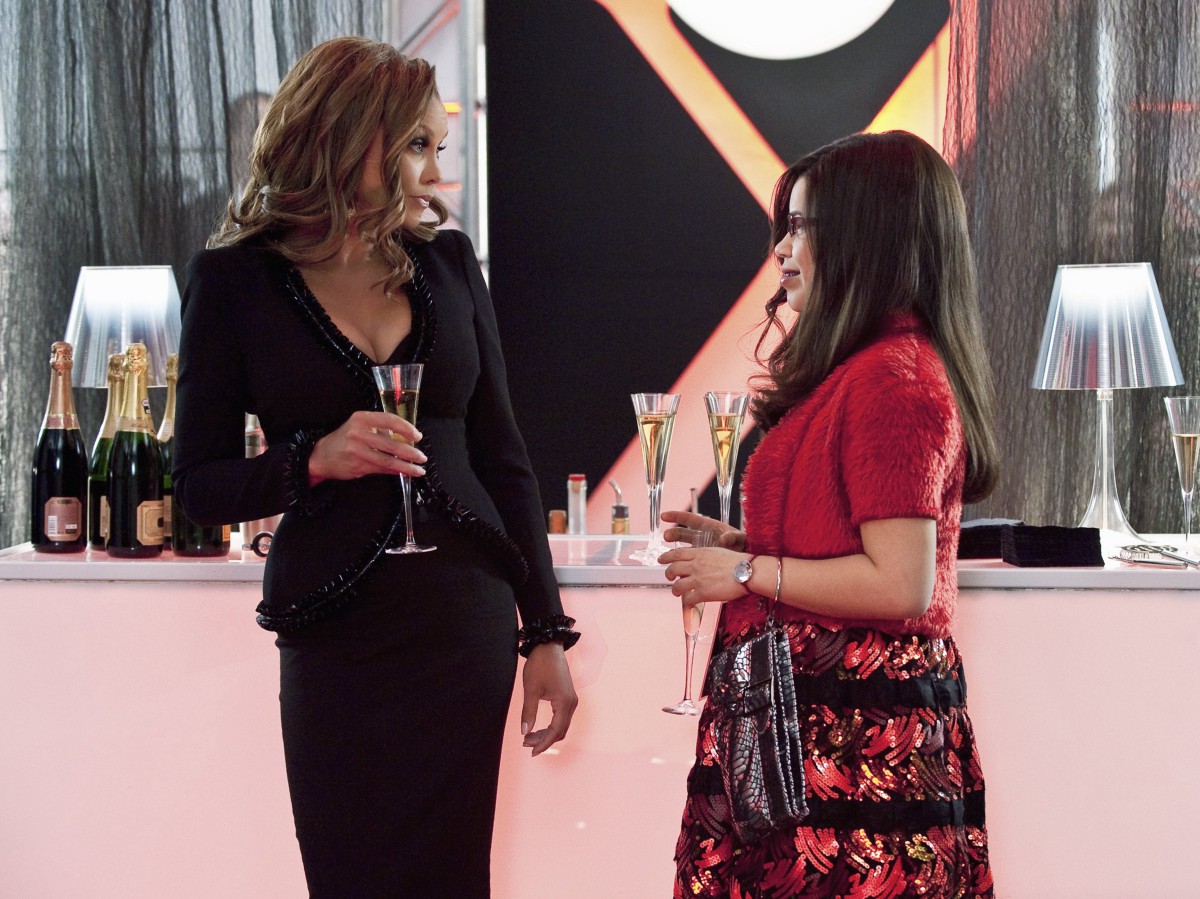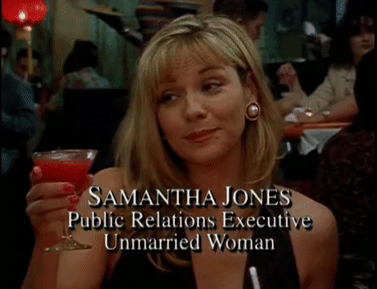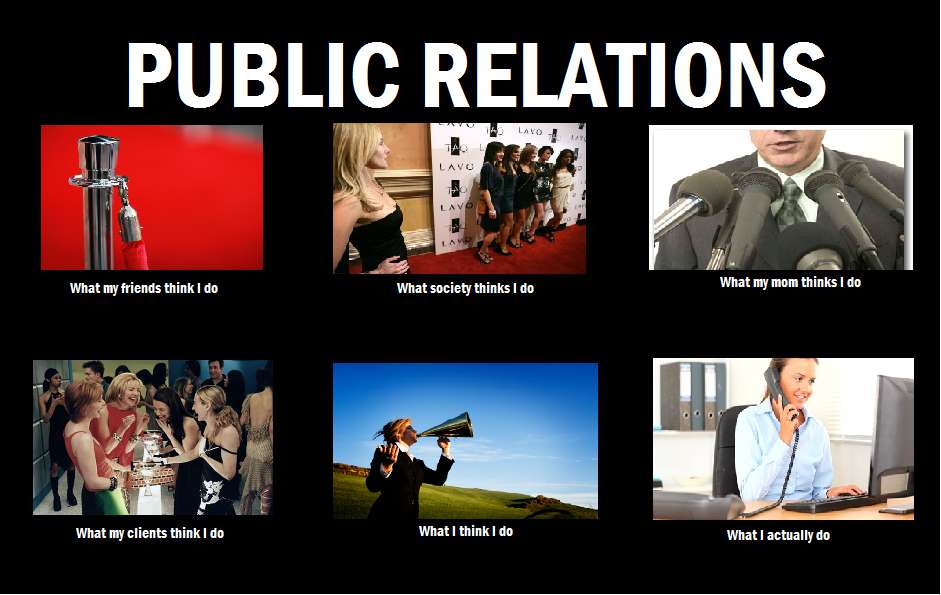It is true that there is much more to public relations than what meets the eye, but often people’s perceptions of the profession can be mistaken. I have summed up just some of these common misconceptions of PR below in the form of an acronym, to hopefully give you a better understanding of what we do and don’t do as PR professionals.

Personal Assistants: Often, at the beginning of our careers, we might land our first role of ‘PR intern’, yet we find ourselves making the coffees for meetings or grabbing the manager’s lunch. This is much more common than not and personally, I believe it is selfish of employers to expect this of interns (sometimes all while being on a big fat wage of £0). Of course, it is fine to lend a helping hand and run the odd errand here and there where needed, but if this is something that starts to become a part of your unwritten job criteria, then you might as well have applied for a Personal Assistant role. Employers, do better! PR students do not spend years studying and paying for a degree to make your coffee. Simple.

Unethical: In the past, this was a very common perception of PR and it still taints the profession’s reputation to this day. I remember working in a supermarket and an older customer asked me what I do in Uni, when I told him I was studying PR, his whole demeanour shifted. He would joke that you could never trust someone in PR and that they will always try to twist your words. PR is not an evil, unethical profession, if anything (in my experience) we try to shed light on the positive parts of a business rather than completely cover up and hide any negative parts of the business. The bad rep of being deceitful is definitely still around today.
Bouncers: This one is a bit funny but there is relevance in it, I promise! So, when holding events there is typically a PR person put ‘on the door’. This is usually to mark people’s names off the guest list upon arriving and turning away anyone that isn’t on the list. Sometimes this can be heated, turning away people that feel entitled to be at the event and back up from your manager may be required! So, we’re not exactly bouncers, but we do refuse entry.
Loud: This is definitely a misconception people have of PR. You do not need to be the life and soul of the party or the loudest person in a room to work in PR. Having confidence will help, but some of the best PR’s I have worked with can be introverts. If you’re an extrovert and could make conversation with a brick wall, great! But it is definitely not an essential criterion for landing a job in PR.
Influencer wannabe’s: This is a more recent misconception developed of PR. Lots of young people don’t fully understand what PR actually entails, so when they see us sharing blog posts, reviewing businesses, and creating our own websites, etc., they might in fact think we are trying to become ‘bloggers’ or ‘influencers’. Don’t get me wrong, if someone paid me to write a post for them I would do it, but more so because I am professionally trained in content creation and copy-writing, not because I am trying to ‘influence’ others, or because I think my opinion needs to be shared. Blogging helps you become noticed by other professionals and it is something that helps you stand out when applying for jobs.
Content Creator: With that being said, yes some of us may be trained in content creation, but this is definitely not a given when studying PR. Content creation is a mix of photography, creative directing, design, and many other niche skills and qualities. This is not something that should be expected of all PR professionals, but it is something I am seeing on more and more job criteria. If you can put together a flat lay and edit it, great. But don’t worry if you can just about apply a filter to your Instagram post. There is always room to learn these skills as we progress.
Rich: Another funny one, but some people genuinely believe this. Depending on where you work, you might be ‘partying’ with celebrities, staying in famous hotels, and drinking fancy champagne as part of your job. Unfortunately, working with celebs does not come hand in hand with a celebrity wage. We are probably just as shocked as you when we are experiencing these situations and the impostor syndrome is real! The bank account does not match the lifestyle sometimes, but that’s all part of it.

Experts: I say experts as an umbrella term, but this basically means expert in everything! Sometimes smaller companies hire a PR professional as someone has advised them that they need PR to succeed. They want someone that does social media, content creation, email marketing, press, digital, events, influencer management, media, and the list goes on. It is important to know that there are people that will have experience in all of these areas, but they will certainly not be experts in each area.
Legal Associates: In areas of PR like crisis management, businesses may turn to us for legal advice. When a disaster strikes in your business, your PR may be just as vital as your Lawyer, but these cannot be confused. We can advise you on how to save your business’s reputation, but we can’t bail you out of jail. If you can’t do the time, don’t do the crime and all that. We can only do so much in a crisis, but we are not above the law.
Alternative Options: It might seem obvious, but PR is definitely not an alternative option to advertising, marketing, social media management, or communications. It actually works best alongside these positions as the PR professional will be able to give their all to their position without spilling fulfilling other roles. Maybe not all are essential, but PR can’t be used as an alternative for other professions.
Trained in Psychology: Yes, it is good to have an understanding of social psychology and how the mind works in order to persuade someone, which is a tactic use in PR to promote a product, business, or campaign. But I think sometimes wider marketing professions might have the perception that the girl that work’s in PR will create a press release that is so convincing that everyone will just have to buy the product. We might know how to persuade, but we definitely aren’t psychologists and people are entitled to free will.
In the know: Looking at the stereotypical idea of PR, we are all gossips. We know everything about everyone and their business and can use this against them to negotiate things and ‘spin’ them our way. This is also not true, we are not Mi5, we do not know everyone’s business. Even if we keep up to date with current affairs, we still might miss something that you saw in the news (as we are human) so don’t expect us to know it all. We don’t.
Only for women: In any TV show you have watched that has a PR professional in (I know you’re thinking of Samantha Jones), they will be portrayed as a blonde outgoing woman, that loves to shop and date. It’s such a bad stereotype that needs changing as it is a professional career, that is totally inclusive of men (but there is room for more as it is heavily female-oriented).

Nice to have: I don’t even know what to say to this one. PR is ESSENTIAL!
Shot Girls: That job advertised by Thompsons night club saying ‘PR staff. Sell shots in nightclub and recruit customers on the street’ is not a job anyone spends years studying to get, and I think it’s quite worrying that some may think that this is what PR actually is.

Grace Blaney is a final year BSc in Communication Management & Public Relations student at Ulster University. She can be found on Twitter and Linkedin.
